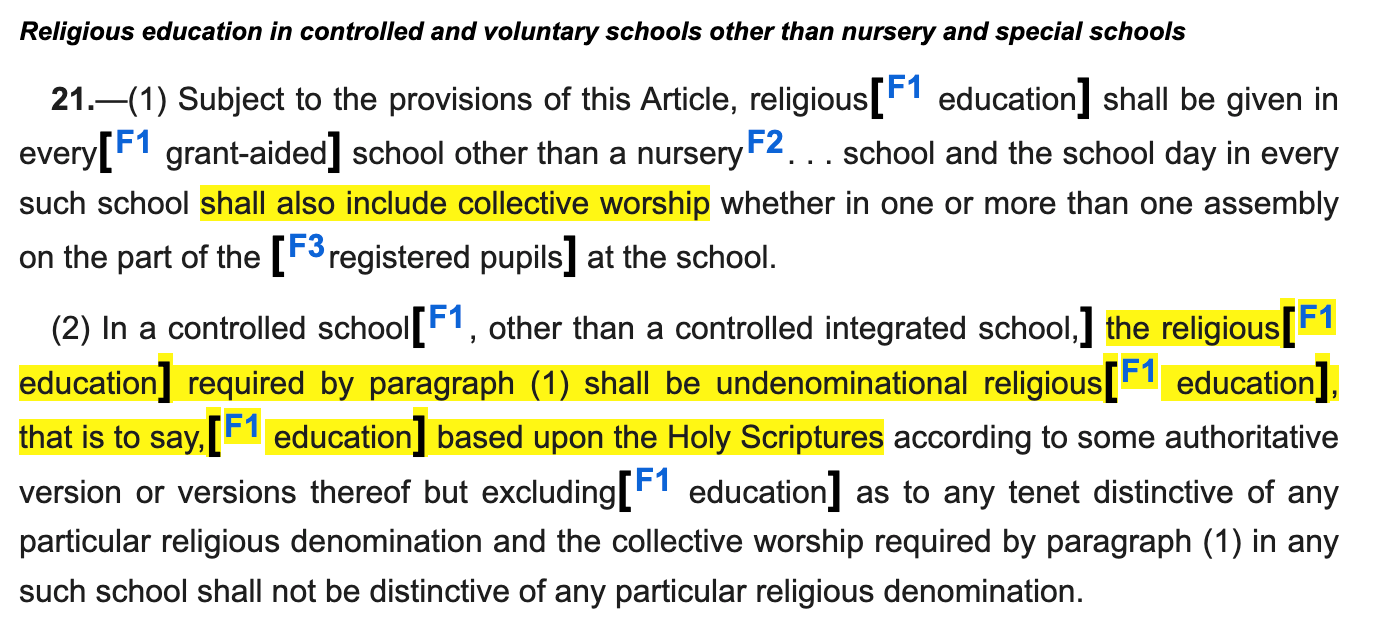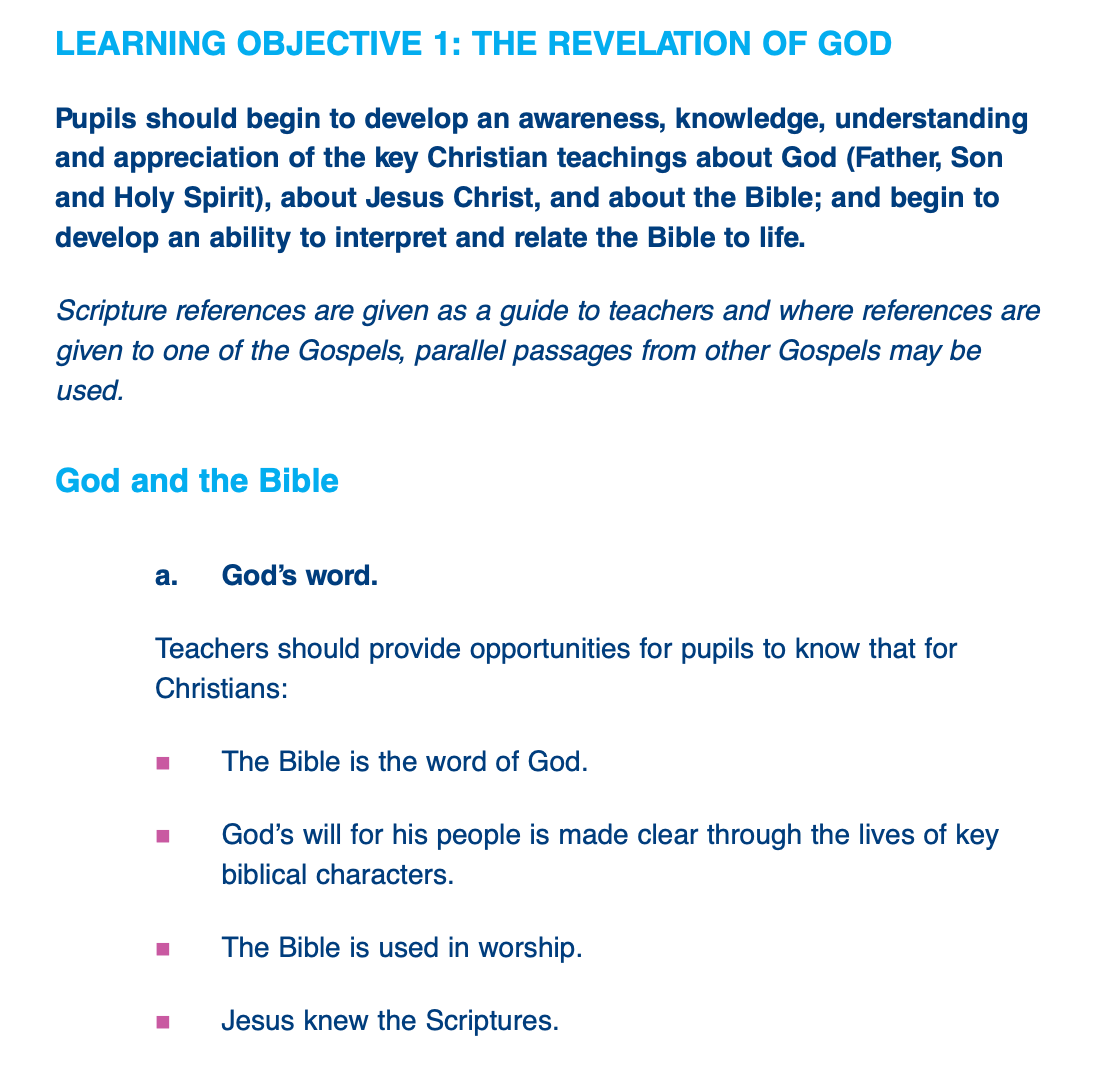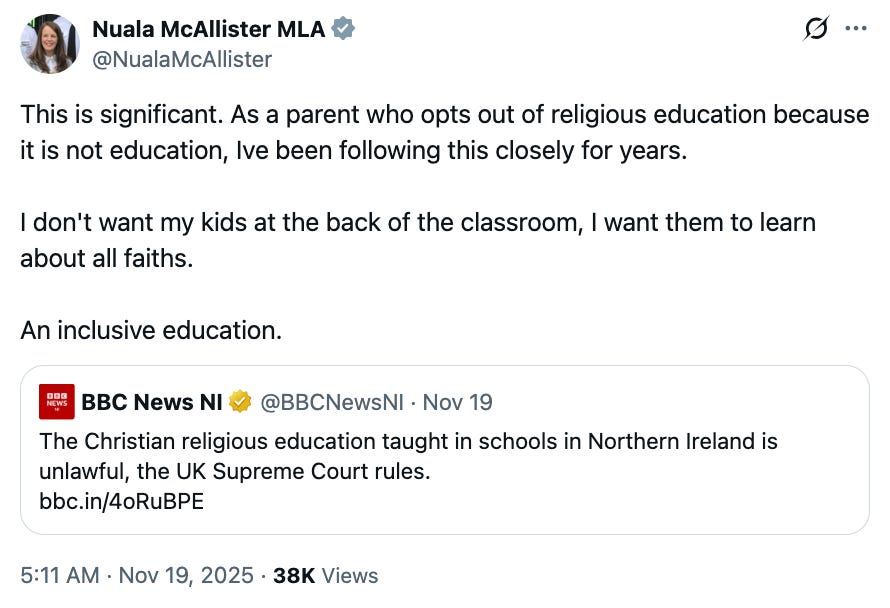UK Supreme Court strikes down N. Ireland's pro-Christian Religious Education curriculum
The landmark ruling declared decades of school-led Christian indoctrination unlawful
This newsletter is free and goes out to over 23,000 subscribers, but it’s only able to sustain itself due to the support I receive from a small percentage of regular readers. Would you please consider becoming one of those supporters? You can use the button below to subscribe or use my usual Patreon page!
In a major ruling, the UK’s Supreme Court ruled that the religious education curriculum taught in Northern Ireland is unlawful because it treats Christianity as if it were true. That faith, and only that faith, is elevated above other religions and non-religion when the curriculum is supposed to be “objective, critical, and pluralistic.”
As a result of the decision, religious education in Northern Ireland will have be revised to give more weight to other religions (and Humanism) while being more critical of Christianity. They’re going to even the playing field as much as possible.
It’s a result that was years in the making.
The situation began in 2019 when a child (known as “JR87” in court documents) was attending what Americans would call a public elementary school. That May, her non-religious parents sent a letter to the school because they were concerned about the nature of the religious education curriculum. They were fine with kids being taught about religion, as the law required, but their daughter was now telling them God created the world and reciting Christian prayers at home. Where the hell was she getting that bullshit from?
The school didn’t have a good response to that. They just said they would continue teaching their curriculum, but the parents could always remove JR87 from class during those lessons. The parents rejected that alternative. They wanted her to learn about religion; they just didn’t want her getting indoctrinated. Plus, if they removed her from those classes, they worried she would be “bullied or isolated as a result.”
This eventually became a much larger issue because if the school was indeed following the law as they claimed they were, then the law was the problem.
It required those public schools to engage in “collective worship” every day—that involved singing Christian hymns and celebrating Christian holidays—and said religious education needed to be non-denominational but “based upon the Holy Scriptures.”
Sure as hell looked like the law was the problem here.
As far as the government-sponsored curriculum went, it looked like something you’d find in Sunday School. Learning Objective 1, for example, was about “The Revelation of God.”
Pupils should begin to develop an awareness, knowledge, understanding and appreciation of the key Christian teachings about God (Father, Son and Holy Spirit), about Jesus Christ, and about the Bible; and begin to develop an ability to interpret and relate the Bible to life.
That’s just page one. The curriculum went on to say teachers needed students to learn that “God is the creator of all things,” that “Praying is a way of talking to God so that we can thank him, praise him, say sorry and ask for help,” that it was important to “Develop a respect for God,” and that they needed to connect “Christian moral principles to [their] personal and social life.”
In no way was this objective teaching about religion. This was pro-Christian propaganda. And why wouldn’t it be? The curriculum was written in 2007 by the “four main Christian Churches in Northern Ireland”—the Catholic Church, the Church of Ireland, the Presbyterian Church and the Methodist Church. Other religions were barely mentioned; in fact, the only time students were required to learn about non-Christian beliefs was through a single unit on “World Religions” much later in their education, long after they were indoctrinated with Christianity.
It was all very ironic given that more than a quarter of people in Northern Ireland (27%) were non-religious in 2021, and that number was on the rise.
As JR87’s father (known as “G” in the court documents) explained in an affidavit, all of this violated his Humanistic beliefs:
… I consider the Bible to be made up of fascinating and culturally important texts, but I read and understand those texts as entirely human literature, rather than any kind of revealed truth from God. It follows that I do not accept—as true—the doctrinal claims of Christianity. I find certain aspects of Christian morality and ethics in Northern Ireland to be disturbing, such as the longstanding and continued discrimination by the main churches against LGBT people in Northern Ireland and I do not want my daughter to be taught that such intolerant and potentially harmful beliefs are true, rather than based on an assumption that the Bible is the infallible “word of God.”
In 2022, the High Court in Belfast ruled that “a fair analysis of the syllabus leads to the conclusion that under the curriculum [Religious Education] is not conveyed in an objective, critical and pluralist manner.”
That decision was later appealed by the Department of Education and overturned—the Court of Appeals basically agreed that the curriculum was pro-Christianity, but they felt the family could just withdraw their daughter from those classes, therefore there wasn’t a legal problem here. It wasn’t indoctrination, they implied, if the family could opt out.
That’s why this ultimately wound up in front of the UK’s highest court.
And this week, that court unanimously agreed that the religious education curriculum in Northern Ireland amounted to Christian “indoctrination” and that it was unfair to ask the family to opt out if they wanted to avoid it.
… there is no commitment in the core syllabus to objectivity or to the development of critical thought. To teach pupils to accept a set of beliefs without critical analysis amounts to evangelism, proselytising, and indoctrination. Rather, the core syllabus encourages pupils faithfully to accept the existence of the Christian God, to accept that good things come from the Christian God, that the Christian God can help in times of adversity and that morality is based upon, and derived from, the existence of the Christian God.
…
Conveying knowledge in a manner which is not objective, critical, and pluralistic on the one hand and indoctrination on the other are, as I have just said, different sides of the same coin.
The result of the decision is that students in Northern Ireland will soon have to learn about the beliefs of other religions—and non-religious philosophy—from a young age. The way Christianity is taught to them will also have to be made more objective. It’ll be a massive rewrite of a religious curriculum that’s been in use for nearly two decades, though the ideas have been pushed in Northern Ireland schools for far longer.
Northern Ireland Humanists Coordinator Boyd Sleator told me yesterday that the manner in which the curriculum will change has yet to be determined and may in fact take another legal battle to clarify. But he seemed optimistic that this would be handled the right way. (He’s not nearly as cynical about politics as I am.)
Sleator added that the family at the center of this case is “over the moon” and thrilled with the outcome.
The lawyer for the family, Darragh Mackin, called this ruling “probably the single most important legal decision for education certainly in the last century.”
And as Northern Ireland assembly member Nuala McAllister put it in a celebratory post, “I don’t want my kids at the back of the classroom, I want them to learn about all faiths. An inclusive education.”
Obviously, not everyone is happy with the ruling. Here’s how a conservative politician—Traditional Unionist Voice leader Jim Allister MP—reacted:
The language used—particularly the inflammatory term ‘indoctrination’ is an affront not only to teachers and parents but to the Christian foundations upon which our education system has long rested.
I reject entirely the suggestion that Christian teaching in our schools amounts to indoctrination. That word has been weaponised to belittle the sincere Christian ethos that shaped our society, our laws and our moral compass. It is an insult to the thousands of teachers who faithfully and honourably deliver RE.
Moreover, in this judgement we see another insidious elevation of rights of non-Christian parents over those of Christian parents.
When you’re used to privilege, neutrality is seen as oppression. The simple fact is if Islam or Humanism were taught to Northern Ireland students the way Christianity is right now, this guy would be having an aneurysm. He’s unable to see the problem because he thinks Christianity should just be the default faith for everyone.
As for collective worship, which is also exclusively Christian, that’s still around… but Sleator said that’s the next thing that needs to be challenged:
‘This judgment is a historic win for the rights of children in Northern Ireland. The Supreme Court has concluded that the [Religious Education] syllabus is “indoctrination” and the right to withdraw from RE and mandatory collective worship is insufficient to deal with this.
‘This ruling should also prompt the governments in England, Scotland, and Wales to revisit the requirement for mandatory collective worship. We hope it is now repealed.’
This ruling reinforces what critics have been saying for years now: For generations, Northern Ireland outsourced its religious education curriculum to churches, then pretended the result was somehow neutral. It wasn’t. The goal was never to inform students about Christianity and other faiths and Humanism. It was to mold them into soldiers for Christ—and to ensure that Christianity remained the unchallenged cultural default.
It’s long past time for the curriculum to change, not just because it was wrong to begin with, but because the demographics of Northern Ireland have changed. You can’t understand society without a deeper understanding of the beliefs that make up the people in it. Christianity is not the only game in town. For decades, families who didn’t share the majority’s faith were told to either put up with a religious curriculum that contradicted their most basic values or remove their children and accept the stigma. The Court has now said, unequivocally, that such a choice is no choice at all.
The work ahead is both obvious and unavoidable. It involves giving equal time to other religions and to non-religion, and ensuring that no student is ever again pressured to participate in worship that contradicts their own conscience. It also means confronting the next problem head-on: mandatory Christian collective worship.
But those changes will be welcome ones. It means embracing diversity rather than some archaic religious monoculture. The Supreme Court did its job. Now educators and lawmakers need to do theirs.





Good! Now if only OUR Supremes could get with the program.
(I know. Wishful thinking)
Be it religion or anything else, I don't know how you can present a matter as truth to children when there isn't a shred of independent corroboration for any part of it. Almost no one in the Bible, including Jesus himself, can be conclusively demonstrated to have ever existed. The Bible is a very strange way for a divine being who supposedly willed the universe into existence to transmit the most important message imaginable.